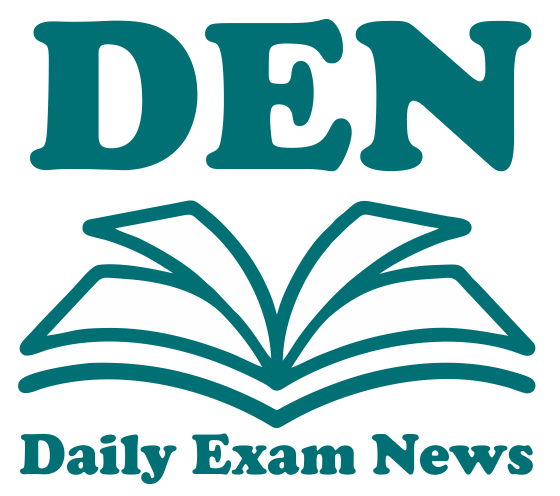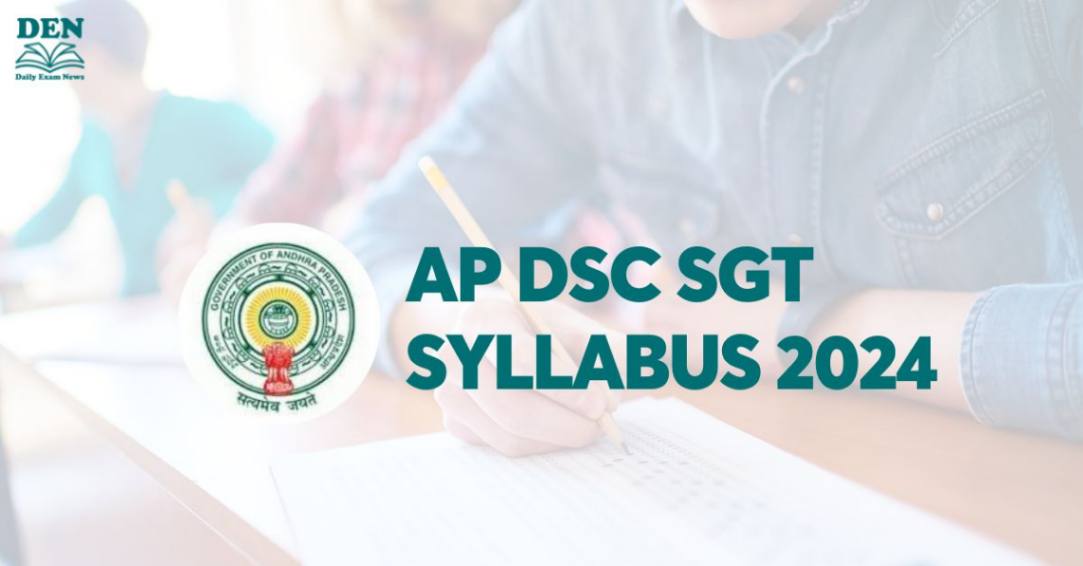The AP DSC SGT Syllabus 2024 has been declared through an official notification on the website of Andhra Pradesh District Selection Committee. The aspiring candidates who are preparing for the exam must know the subjects covered will include questions from Educational Psychology, learning, perspectives in Education and current affairs etc. You must be prepared with the eczema pattern and marking scheme for the AP DSC exam. The exam will comprise of a total of 160 questions and a total of 80 marks for written exam. For more details regarding exam pattern, marking scheme, topic wise syllabus keep reading the article.
Click Here To Visit The Official Website!
AP DSC SGT Syllabus 2024
The aspiring candidates will have to prepare subjects related to General Knowledge. It will basically include topics from history, current affairs, empowerments done for teachers, perspectives of education. Moreover, very general and generic questions from psychology, learning and personality can also be expected. Read the table below to know more about the same.
Part 1: General Knowledge Syllabus
| Topics Covered in Part 1 General Knowledge for AP DSC SGT Exam | ||
| Part | Section | Topics |
| PART – I | General Knowledge and Current Affairs | Standard G.K |
| Events happened in the year 2024 | ||
Part II: Perspectives in Education Syllabus
| Topics Covered in Part II: Perspectives in Education Syllabus for AP DSC SGT Exam | ||
| Part | Section | Topics |
| PART II | Perspectives in Education | |
| 1. History of Education | The Education in Ancient India – Pre-Vedic and Post-Vedic period, Medieval Education. , Education in Pre Independent era – Wood’s Despatch (1854), Hunter Commission (1882), Hartog Committee (1929), Sargent Committee (1944). Education in Post Independent era – Mudaliar Commission (1952-53), Kothari Commission (1964-66), Ishwarbhai Patel committee (1977), NPE-1986, POA-1992. | |
| 2. Teacher Empowerment | Need, interventions for empowerment, Professional code of conduct for teachers, Teacher motivation, Professional development of Teachers and Teacher organizations, National / State Level Organizations for Teacher Education, Maintenance of Records and Registers in Schools. | |
| 3. Educational Concerns in Contemporary India | Democracy and Education, Equality, Equity, Quality in Education, Equality of Educational opportunities. , Economics of Education, Education as Human Capital, Education and Human Resource Development, Literacy – Saakshar Bharat Mission. , Population Education, Gender – Equality, Equity and Empowerment of Women, Urbanization and migration, Life skills. , Adolescence Education. , Value Education – Moral Value and Professional Ethics in Education. , Health and Physical Education. , Inclusive Education – Classroom Management in Inclusive Education. , Role of Education in view of Liberalization, Privatization and Globalization. , Programmes and Projects – APPEP, DPEP, Sarva Shiksha Abhiyan, National Programme for Education of Girls at Elementary Level (NPEGEL), Rashtriya Madhyamika Shiksha Abhiyan (RMSA), Rashtriya Aveshekar Abhiyan (RAA), KGBVs, Model Schools. , Incentives and special provisions – Mid Day Meals, Free Books, Scholarship, Awards, Welfare Hostels, Transportation. , Current Trends in Education – Badi Pilustondi, Badiki Vasta, Mavuru – ManaBadi, Vidyanjali, Swachh Patasala, Inspire, Kalavutsav. | |
| 4. Acts / Rights | Right of Children to Free and Compulsory Education Act – 2009. , Right to Information Act – 2005. , Child Rights. , Human Rights. | |
| 5. National Curriculum – Framework, 2005 | Perspective, Guiding Principles, Learning and Knowledge, Teaching Learning Process, Assessment, Systemic Reforms. | |
| 6. National Educational Policy – 2020 | ||
Part III: Educational Psychology Syllabus
| Topics Covered in Part III: Educational Psychology Syllabus for AP DSC SGT Exam | ||
| Part | Section | Topics |
| PART III | Educational Psychology | |
| 1. Development of Child | Development, Growth & Maturation – Concept & Nature. , Principles of development and their educational implications. , Factors influencing Development – Biological, Psychological, Sociological, Emotional. , Dimensions of Development and their interrelationship – Physical & Motor, Cognitive, Emotional, Social, Moral, Language relating to Infancy, Early Childhood, Late Childhood, Adolescence. , Understanding Development – Piaget, Kohlberg, Chomsky, Carl Rogers, Erikson. | |
| 2. Individual Differences | Inter and intra individual differences, meaning, nature and theories of intelligence with special emphasis on multiple intelligence, IQ, assessment of intelligence, EQ, Creativity. , Attitude, Aptitude, Interest, Habit and its Influence on Intelligence – Classroom implementation. | |
| 3. Learning | Theories and approaches of learning, learning curves, Factors, Phases, Dimensions of learning, Types of learning, Transfer of learning. , Memory, Forgetting, Learning and assessment – Classroom implementation. Children with special needs – Inclusive Education. | |
| 4. Personality | Nature, characteristics and theories of personality, factors of Personality, Assessment of Personality, Mental health, Adjustment, Stress – Nature, Symptoms and management. , Emotional intelligence, Management of emotions – Classroom implementation. | |
AP DSC SGT Exam Pattern 2024
The following describes the AP DSC SGT Exam Pattern. Examine this so that candidates can properly organize their study approach and comprehend the sectional weighting, question kinds, and marking scheme.
The exam lasts two hours and thirty minutes and consists of objective-type questions. It receives a score of 80 points. Selection is made in accordance with Rule 18 and is based on the total scores from the Written Test (TRT), which makes up 80% of the total marks, and the APTET, which makes up the remaining 20%.
| Subject | No. of questions | Marks |
| General Knowledge and Current Affairs | 16 | 8 |
| Perspectives in Education | 08 | 04 |
| Education Psychology | 16 | 08 |
| (Optional) – Language-I (Indian Languages) (Telugu/Urdu/Hindi/Tamil/Oriya/ Kannada/ Sanskrit) | 24 | 12 |
| Language-II (English) | 24 | 12 |
| Mathematics | 24 | 12 |
| Science | 24 | 12 |
| Social Studies | 24 | 12 |
| Total | 160 | 80 |
Check here for more information-
Hopefully, this information was useful for all the aspiring candidates preparing for the government exams. Check DailyExamNews to stay informed about the latest recruitments, tests, vacancies, and developments regarding government exams.

